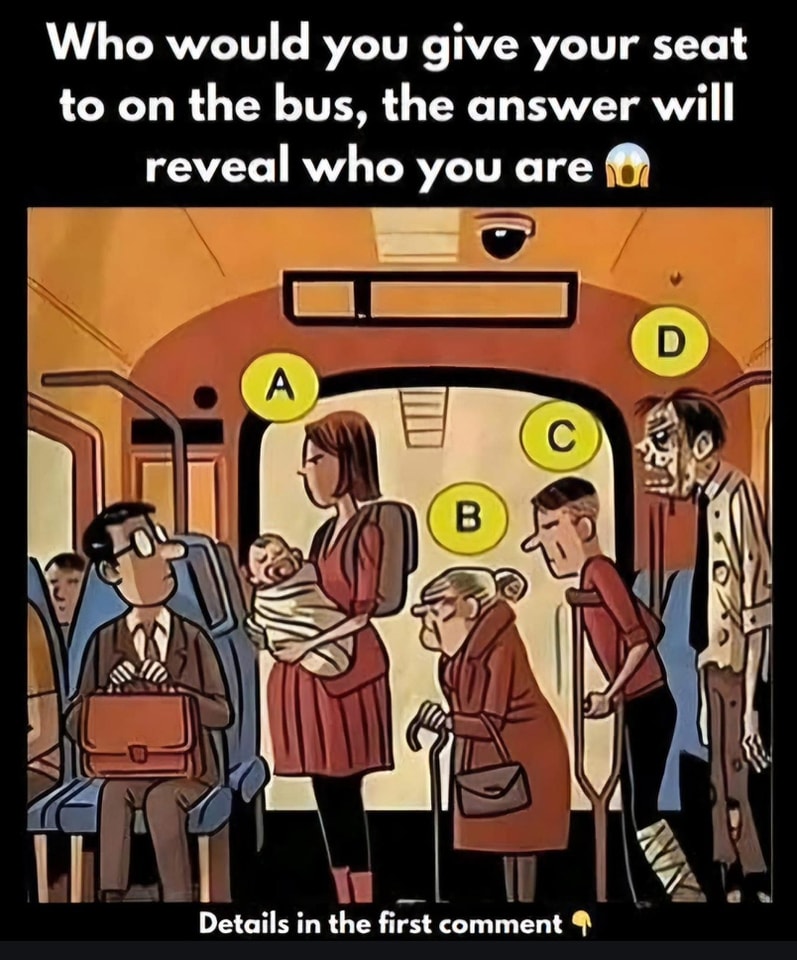
Our daily decisions, from offering a seat on a bus to sharing an umbrella, can provide profound insights into our character and values. Engaging with hypothetical scenarios not only sharpens our decision-making skills but also unveils underlying personality traits. Let’s explore several thought-provoking situations and what your choices in these contexts might indicate about you.
1. The Bus Seat Dilemma: Who Receives Your Seat?
Imagine you’re on a crowded bus with only one available seat. Four individuals stand before you: a mother with her baby, an elderly woman, a man on crutches, and a visibly ill person. Your decision to offer the seat can reflect different values:
-
Elderly Woman: Choosing to seat her demonstrates a deep respect for tradition and the wisdom that comes with age.
-
Mother with Baby: Prioritizing her highlights empathy and recognition of the challenges faced by parents with young children.
-
Man on Crutches: Assisting him showcases fairness and an understanding of immediate physical needs.
-
Visibly Ill Person: Helping this individual reveals compassion and concern for health-related vulnerabilities.
2. The Lifeboat Scenario: Who Do You Save First?
In a dire situation with a lifeboat accommodating only one more person, you must choose between a doctor, an artist, a scientist, and a child:
-
Doctor: Saving the doctor reflects practicality, valuing skills that can aid others in survival situations
-
Child: Prioritizing the child underscores a focus on the future and the potential it holds.
-
Scientist: Choosing the scientist indicates an appreciation for innovation and problem-solving abilities.
-
Artist: Rescuing the artist reveals a value for creativity and cultural enrichment.
3. The Last Slice of Pizza: Who Gets It?
At a gathering, the final slice of pizza is up for grabs among your friend, the host, a stranger, and a child:
-
Friend: Offering it to your friend demonstrates loyalty and the importance of established relationships
-
Host: Giving it to the host signifies respect and gratitude for their hospitality.
-
Stranger: Choosing the stranger reflects generosity and openness to new connections.
-
Child: Handing it to the child highlights compassion and a nurturing instinct.
4. Sharing Your Umbrella: Who Do You Cover?
Caught in a sudden downpour with room under your umbrella for only one more person—a friend, a child, an elderly individual, or an injured person:
-
Friend: Sheltering your friend shows camaraderie and mutual support.
-
Child: Protecting the child exhibits nurturing qualities and concern for the vulnerable.
-
Elderly Individual: Offering cover to the elderly reflects kindness and respect for seniors.
-
Injured Person: Helping the injured demonstrates attentiveness and a readiness to assist those in immediate need.
5. Emergency Exit: Who Do You Assist First?
During a fire alarm, you can help only one person to safety: a pregnant woman, an elderly man, a child, or someone in a wheelchai:
-
Pregnant Woman: Assisting her shows you value new life and the well-being of both mother and unborn child.
-
Elderly Man: Helping him highlights respect for experience and acknowledgment of potential mobility challenges.
-
Child: Choosing the child indicates a protective nature towards the young and defenseless.
-
Person in Wheelchair: Aiding this individual reflects a strong sense of justice and commitment to supporting those with disabilities.
6. The Single Rose: Who Do You Give It To?
With one rose to offer, your choices are your mother, your partner, a close friend, or a sorrowful stranger:
-
Mother: Presenting the rose to your mother signifies deep family loyalty and appreciation.
-
Partner: Giving it to your partner reflects romantic devotion and affection.Close Friend: Offering the rose to a friend highlights the value you place on friendship.
-
Sorrowful Stranger: Handing it to a stranger reveals a desire to spread joy and kindness to those in need.
7. The Doctor’s Waiting Room: Who Goes First?
In a medical office with one appointment slot left, you decide among a child, an elderly man, a pregnant woman, and a sick individual:
-
Child: Prioritizing the child shows nurturing instincts and concern for youthful well-being.
-
Elderly Man: Choosing him reflects respect for age and potential health vulnerabilities.
-
Pregnant Woman: Selecting her highlights compassion for maternal health.
-
Sick Individual: Allowing them to go first demonstrates practicality and immediate concern for illness.
8. The Last Concert Ticket: Who Do You Give It To?
You possess the final ticket to a sought-after concert and must choose its recipient: a friend, an elderly fan, a teenager, or someone who traveled far:
-
Friend: Gifting it to your friend showcases loyalty and shared interests.
-
Elderly Fan: Offering it to the elderly fan reflects respect for lifelong passions and missed opportunities.
-
Teenager: Choosing the teenager indicates encouragement of youthful enthusiasm and dreams.
-
Traveler: Giving it to the traveler values dedication and the effort they’ve made to attend.





